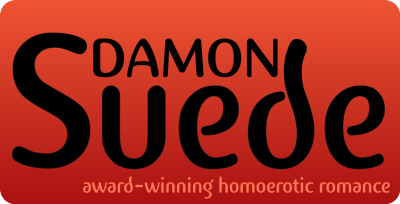Action Pact
by Damon Suede
(why some erotic romances are neither)
All of us have had the misfortune to read
erotic romance that, y’know,
isn’t. Ugh. What’s worse?
In theory the characters look hot, the
setup seems charged, the intercourse pushes every kind of blistering
sexual boundary but in the end…
meh. How does that
happen? When does taboo and carnal become tedious and comical? How
can something salacious become a snoozefest? Like comedy, sexiness
that falls flat can actually kill the enjoyment of an entire romance
or even doom a book to the will-not-finish pile… and yet erotic
romances need a certain amount of sexytimes to merit the name,
right?
Well, I write erotic romance, so I think
about this problem constantly. When I’m reading or writing, I’m
always tracking how stories get under our skin the right and the
wrong ways. After 20 years writing for film and theatre, here’s what
I’m learned about hotness on the page:
Actions fascinate people; activities bore them to tears.
That almost sounds like a tautology, but
it ain’t.
 Readers connect to characters making
choices and making change happen in and around their lives; they
always pay attention to specific actions focused on a goal which
must overcome friction. Two naked people rolling around sticking
parts of themselves into and onto each other may be titillating for
a couple minutes of rubbernecking, but what engages the reader
beyond the wet spots is the ways that the interaction transform the
people involved or the events around them. Action arouses interest,
provokes desire, and sparks empathy. On the other hand, activity
defines tedium: a task or motion repeated without consequence or
alteration. The only difference between the two is the will of
the person involved. As Gilda,
Rita Hayworth seduces in order to survive and in order to keep her
secrets buried.
Readers connect to characters making
choices and making change happen in and around their lives; they
always pay attention to specific actions focused on a goal which
must overcome friction. Two naked people rolling around sticking
parts of themselves into and onto each other may be titillating for
a couple minutes of rubbernecking, but what engages the reader
beyond the wet spots is the ways that the interaction transform the
people involved or the events around them. Action arouses interest,
provokes desire, and sparks empathy. On the other hand, activity
defines tedium: a task or motion repeated without consequence or
alteration. The only difference between the two is the will of
the person involved. As Gilda,
Rita Hayworth seduces in order to survive and in order to keep her
secrets buried.
Specificity is the source of everything
great.
THIS is the reason that Jane Austen can
make you hold your breath when hands brush or eyes meet. Charged by
the strictures of Regency Britain, her protagonists risk ruin every
time they speak too
candidly or allow intimate improprieties like a lingering
glance. The tension
allows actions to occur in maddeningly subtle and seductive ways.
Contrariwise, Showgirls
will always be a piece of flaccid sophomoric trash entertaining for
all the wrong reasons, no
matter how much groping/grabbing/grinding goes on. Even with the
relentless nudity and “kinky” shenanigans, all of the incessant
repetitive activity affects nothing, changes nothing, means nothing;
wall-to-wall candy-colored sleaze at a cost of sixty million dollars and it cannot even succeed as
softcore porn! Yikes.
Readers pick up romance with certain
expectations. At the most basic level, they want to experience the
unfolding of a relationship that ends positively. Fair enough. But
if the protagonists hop in the sack on page two then squirm and
squirt for 200 pages without sense or consequence, it will have the
emotional and erotic impact of a re-grouting a tub.
Since
Hot Head
came out, I’ve gotten anywhere from 40 to 50
fan letters focusing entirely on the first kiss between my heroes.
That scene is ten pages long and not by accident! I’ll admit,
I LOVE kissing and I know that fetish crept into the writing of that
scene… but I believe the reason that liplock nails people is because
there are about four actions occurring at that exact moment their
mouths meet. Those actions
infuse the kiss with thermonuclear friction and so it sticks in
people’s minds. The readers remember the heat and charge of that
moment because of the
actions woven through it.
There’s an old chestnut about Hamlet
being this amazing tragic hero who does nothing. This is, of course,
complete bullshit. Hamlet never
stops doing things for a
moment: he argues with a ghost, pretends to be insane, stages a
play, attacks his friends, insults his family and sullies his
innocent lady love with some very nasty innuendo, murders and
betrays and wrestles with cant! Hamlet’s actions in the play never
STOP; in fact the only thing he doesn’t do until the gory finale is
take his justified revenge… but all of those
other actions lead
inexorably and ineffably to that perfect bloodthirsty finale.
 Okay,
so fair enough. Shakespeare knew his shit. Big whoop. How does that
translate to the juicy bone-dance you have planned for your
protagonists?
Okay,
so fair enough. Shakespeare knew his shit. Big whoop. How does that
translate to the juicy bone-dance you have planned for your
protagonists?
Action or activity? Any activity can be
elevated to an action, if the stakes escalate and the context
carries enough charge. And any action can be made into a boring
activity if the author removes the stakes and context. The simplest
way to test a love scene? Ask yourself after the characters
climax: what changed because
of the intimacy that just occurred? If the answer is “nothing”
then you’ve just wasted time reading (or writing) an activity which
fits the story like a concrete swimsuit.
In essence, readers trust authors to
provide action that sustains the story and rewards the time spent
inhabiting its world. The author’s tacit promise to provide action
separates pros from hacks (and prose from pablum). This
responsibility to provide action is the basic contract between
entertainment and audience. It’s the root of the overworn “Show
don’t tell” criticism from English 101 classes across the world.
It’s a relentless reminder to professional authors that writing is a
job and not a hobby.
My question to you is: how do you plan to
keep the sex active rather than an activity. What does the act of
sexual intercourse do, get, or make change in their relationship
that drives the story forward? As an author, you have to move
beyond the mechanical porno model (“time for another cumshot.”)
towards character. How is THIS sex scene different than the last or
the next sex scenes? How do the intimacies build upon each other and
refract in the characters’ lives? In life people have sex for any
number of reasons, but only some of those offer the kind of drama
needed to sustain a narrative. Having sex for revenge, having sex to
heal, having sex to cement a bond are all clear, playable actions
for a character. Activities that will kill the story or cripple it:
having sex to scratch an itch, having sex because you’re bored,
having sex because the editor said, “It’s been 30 pages.”
Of
course that’s not just sex; EVERY scene in your story flourishes
with action and buckles under activities. Unfortunately love scenes
in particular tend to become literary quicksand if nothing’s going
on but the smoosh. As Hollywood has often observed, any sex scenes
on screen stop your film dead for the three minutes it takes to run
a montage of body parts over a song. Most popular film and
television treats love scenes voyeuristically…as boring, static,
inconsequential activities; small wonder that popular fiction does
the same.
Bottom line: if you give your readers
permission to skim they will. Agatha Christie knew this, she
provided new information on every page. Readers couldn’t skim or
they’d be lost. Sex scenes need that kind of precision and context.
No two couples make love the same way; sexual intimacy is (and
should be) as singular as the people involved. Why would any author
waste an opportunity to flesh out these subtle gradations in a
character by foisting generic hokey-pokey onto their readers?
A book is a promise.
 When a reader trusts me enough to plunk
down hard-earned money to buy something I made, I believe I owe them
something. Labeling a book “erotic romance” establishes a pact with
our audience, and we flout it at our peril. I had a novella called
Grown Men
released by Riptide on October 30 and in many
ways it’s raunchier and riskier than my first novel. In a sci-fi
universe which encourages genetic modification and franchised sex
resorts, things were gonna get a little kinky and carnal. An
eight-foot giant presents certain…umm
…challenges and opportunities to a normal-sized human lover. My
two heroes demanded a different kind of eroticism, and the vast
disparity between their sizes made certain things possible and other
things scary. The
eroticism needed to be specific or it would have sucked
asteroids. Discovering
the intimacy between them allowed me to map the relationship between
them on their terms. They made the love, I just caught it on paper.
When a reader trusts me enough to plunk
down hard-earned money to buy something I made, I believe I owe them
something. Labeling a book “erotic romance” establishes a pact with
our audience, and we flout it at our peril. I had a novella called
Grown Men
released by Riptide on October 30 and in many
ways it’s raunchier and riskier than my first novel. In a sci-fi
universe which encourages genetic modification and franchised sex
resorts, things were gonna get a little kinky and carnal. An
eight-foot giant presents certain…umm
…challenges and opportunities to a normal-sized human lover. My
two heroes demanded a different kind of eroticism, and the vast
disparity between their sizes made certain things possible and other
things scary. The
eroticism needed to be specific or it would have sucked
asteroids. Discovering
the intimacy between them allowed me to map the relationship between
them on their terms. They made the love, I just caught it on paper.
So, the next time you pick up an erotic
romance, get specific! Pay
attention to the sex. Is something happening during the scene or
does everything stop so they can insert tab A into slot B enough to
punch the meter? Distinguish between actions and activities.
Learn to spot activities when they crop up. Don’t put up with them
in your own writing or anyone else’s. Does sexiness only appear when
literal SEX is occurring or do they build sexiness into the
characters’ transformations and the world of the book. When and how
does it turn you on? If you eliminated a scene of intimacy how would
that affect the story if at all?
Hold all your erotic scenes accountable,
those you write and those you read. Are your characters
doing the deed,
having sex, or
making love? Invest your
intimacy with meaning and context to wring every drop of possible
power out of each moment.
Action is a pact all books make. As writers, it’s a promise to our readers, a bargain with our characters, and a discipline we owe ourselves.

Copyright 2011. Damon Suede. All Rights Reserved
If you wish to republish this article, just drop me a line.

